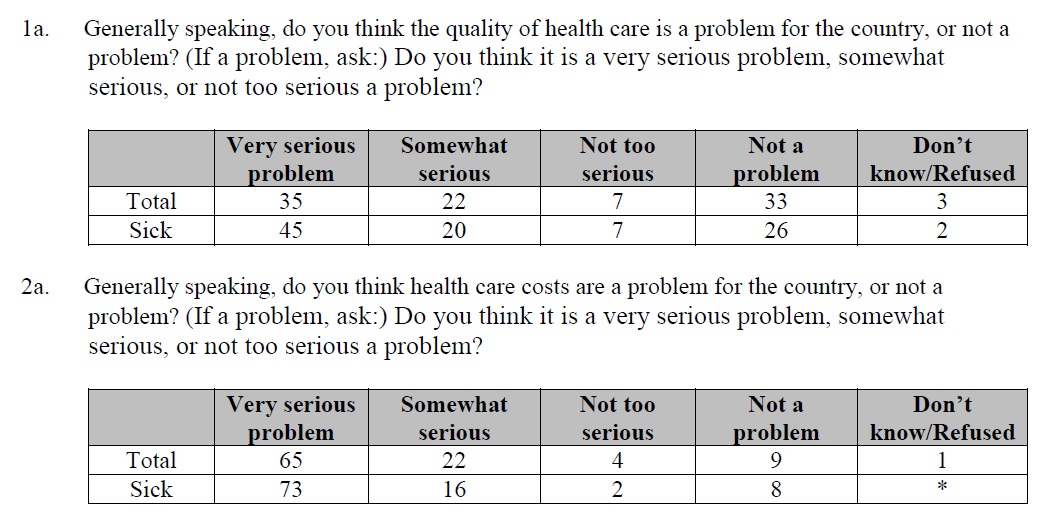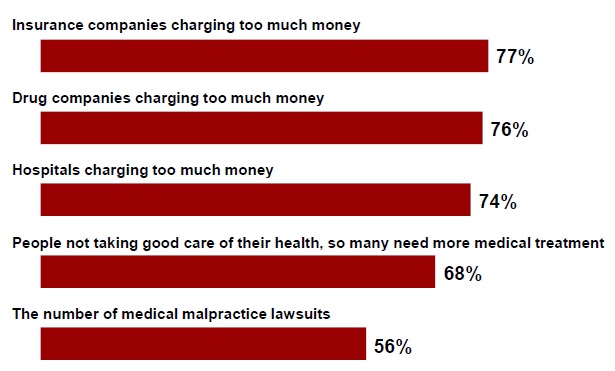For those who have not had the time to dig into the survey results from yesterday’s NPR, Harvard School of Public Health and the Robert Wood Johnson’s “Poll: Sick in America,” do yourself a favor and do.
The poll examined multiple questions around the healthcare system and specifically focused in on healthcare quality and cost. What made this survey even more interesting was the focus on asking these questions to patients actually using the system. Of the 1508 adults (18+) who completed the survey, 27% defined themselves as having a “serious illness, medical condition, injury, or disability requiring a lot of medical care or who had been hospitalized overnight in the past 12 months.”
Rather than describing the survey in detail, and how its findings continue support the need for substantive change in healthcare, allow me to focus in on a few questions. Let’s start with the overview questions pertaining to cost and quality.
As the questions below show, individuals who completed the survey who identified themselves as “sick” were more likely to report various serious problems with quality and cost than those who did not identify themselves as sick.
And this is no surprise.
We have known for some time that those who have gone through the healthcare system have a very different take on it than those simply observing from the outside. And to take that thought a step further, there are often striking differences between what providers in healthcare think and what patients think. Looking at these data, it is clear that in most cases few people think that quality and cost in healthcare are “not a problem.” This is somewhat helpful as in order to start to move us all towards a system that is higher performing on quality metrics and can lower the cost of healthcare, we are going to have to have a public that is increasingly dissatisfied with healthcare.
We are going to all have to speak up.
When asked if doctors spend enough time with their patients, both groups believed that this was not true. While these data may not be surprising as many have complained about this for some time, it does reinforce the issue that the current healthcare system often forces providers to see patients as quickly as possible. Without going into detail again on this topic, one could read our piece on fee for service to learn more.
Hands down, my favorite bit of data from this survey came from the question: “A number of things have been suggested as possible reasons for rising health care costs in the country today. Please tell me whether you feel it is a reason or not a reason for rising health care costs in the country today. (If a reason, ask:) Is it a major reason or a minor reason?” Below are the “major” reasons.
These data help show that while the public is aware healthcare has some cost control issues, there are a few items they see as critical to driving cost. From the summary:
“About three-quarters of Americans believe that drug companies (85%), hospitals (78%), and insurance companies (75%) charging too much money are major reasons for rising health care costs. Seventy percent of sick Americans say that people not taking good care of their health, which leads them to need more medical treatment, is a major reason. Also, about six in ten sick Americans (61%) say fraud and abuse by some hospitals, doctors and nursing homes is a major reason.”
Rather than driving into this question and again pointing out what the cost drivers in healthcare are, let me just conclude with all of the above have an impact in healthcare in some way shape or form (with maybe the exception of medical malpractice).
It has been said many times before, but healthcare looks quite different depending on where you sit. Sometimes the opinions of those making decisions about healthcare come from a place where they have not been in the hospital bed and do not know what it is like to experience healthcare in this country when sick. If you have not ever had the chance to read Jonathan Cohn’s brilliant book, Sick: The untold story of America’s healthcare system, please do as it offers up many accounts of people who have been sick and suffered because of the healthcare system.
I applaud this collaborative effort between NPR, the Robert Wood Johnson Foundation and the Harvard School of Public Health for actually looking at real people – sick people in healthcare and asking their opinion. This matters.
The next few decisions we make in healthcare need to be informed by data such as these.
Take some time and work your way through the survey. There is a lot there to take away. Starting here can give you access to the charts and summary documents.
What conclusions do you draw? What were your thoughts on their approach?
 occupy
occupy


